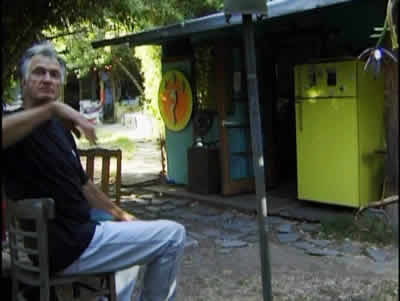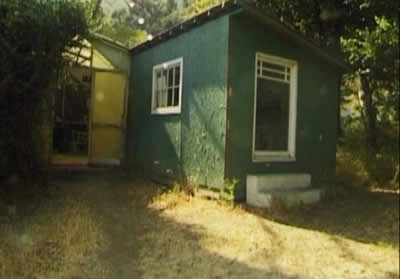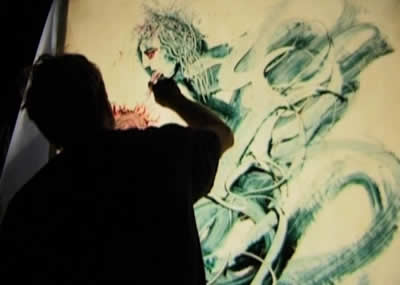Flower children, crazy mystics, artists en tout genre, eccentrics and dissidents, strange healing rituals and prayers… you’re in for a beatnik treat.
“Malibu Song” by Natalie Lettner and Werner Hanak, produced between 2002 and 2006 just had its US premiere at the Goethe Institute on October 30th 2008, as part of the Made in Austria series, presented in collaboration with the Austrian Consulate.
It chronicles the eviction process of a tight community of artists living on the Rodeo Grounds in Lower Topanga, whose land is purchased by the California State Parks. It draws affectionate portraits of many different and unique characters going through this uprooting. Some of them have lived there for thirty or forty years and here must lose their home and way of life, “their deep roots yanked up” in Herb’s words.
While it does deal with painful loss, the film is not a whimpering or melodramatic piece however, rather a celebration of these creative neighbors and their fairy land bubble.
Norton is a lifeguard and artist but really, he is a superhero who travels to the center of the Earth to save the universe.
James, the smelly poet (at least, in one scene) and painter brought to light by Andy Warhol years back, and Pablo, handsome nature child, poet and publisher, both recount their fairy tales of the Rodeo Grounds.
Baretta sings the Malibu song in his baritone voice. He’s a big-bellied man, he lives in a shack with his radio and there’s a veladora on his table and an assortment of varied things outside the shack – useless to the profane but surely treasures. (One is bound to suspect he must be a superhero too.)
Everyone here seems to be a collector of overlooked treasures.
Herb Bermann lives “on the outskirts of the Milky Way most of the time…” He is an awarded writer, some of his poems were used as lyrics for Captain Beefheart. He recalls some of the many talents coming through Topanga – Neil Young, Linda Ronstadt, the Mamas and Papas to name a few.
And there’s Carole, the pretty flower child with the true hippie spirit, who came one night in 68 or 69 and stayed since; Larry, the mad uncle who invented the flying sword;  determined Coliena; the girl who jumps on the trampoline throughout the movie, Pablo’s sister; and a few more.
determined Coliena; the girl who jumps on the trampoline throughout the movie, Pablo’s sister; and a few more.
The houses, the land have their own tangible life as well, as Werner Hanak, one of the filmmakers, explains in the Q&A.
The Rodeo Grounds were rodeo grounds in the 1800s, then a Japanese fisherman village in the early 1900s, a resort for actors like Chaplin or Humphrey Bogart in the 50s, then purchased by the Athletic club and rented to this community of artists, and now purchased by the California State Parks. They are not the most hospitable though – floods, fires, earthquakes are common.
We have entered another zone, a different world. The mover comes, hired to pack the precious belongings for the departure. He seems so incongruous, so out of place with his little beeping machine that keeps some sort of inventory or whatever it does. He contrasts with the philosophy here.
James carefully chooses his words to describe it:
“Life’s about being a lazy poet. Life was not given to us to be productive.”
Yet, these are all vibrant artists, producing poetry every moment.
He’s figured out that art is stupid but you still have to do it, Norton says about James.
Norton paints on glass panes. His paintings are live and constantly shifting, constantly changing, evoking impermanence. One picture fades into a new one and a new one and another. It seems like a good parallel for the Rodeo Grounds, which shifted from rodeo grounds to Japanese village to artist community to state park, in progress, in constant progress, evolution…
The Austrian Consulate will present four more films from Austria to be screened these next two Thursdays at the Goethe Institute. Please visit the Goethe Institute’s website for more information or click here.
*****
Weak: 1 Star Average: 2 Stars Good: 3 Stars Very Good: 4 Stars Excellent: 5 Stars

